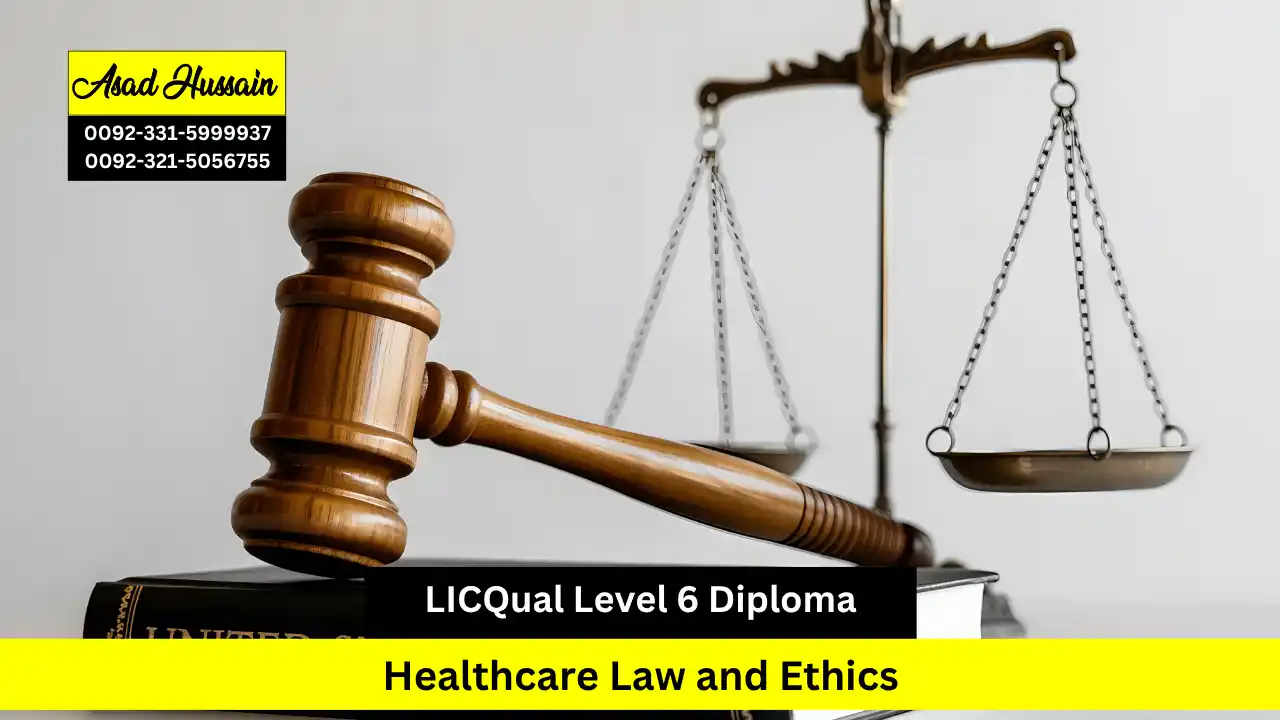The LICQual Level 6 Diploma in Healthcare Law and Ethics is a globally recognized qualification designed to equip healthcare professionals with the legal and ethical knowledge essential for navigating the complex modern healthcare landscape. As the healthcare industry continues to evolve, professionals must possess a solid understanding of healthcare legislation, medical ethics, and patient rights to ensure compliance, integrity, and high standards of care. This diploma Ethics provides the expertise needed to make informed decisions that balance professional obligations, ethical principles, and legal responsibilities in healthcare settings.
LICQual Level 6 Diploma in Healthcare Law and Ethics of this advanced qualification is to empower learners to interpret, apply, and manage healthcare laws and ethical frameworks within their organizations. It explores the intersection of medical law, healthcare policy, bioethics, and patient confidentiality, preparing learners to handle real-world ethical dilemmas with confidence and professionalism. By integrating theory with practical case studies, the course Ethics ensures learners can translate legal and ethical concepts into effective practice in clinical and administrative environments.
Through the LICQual Level 6 Diploma in Healthcare Law and Ethics, participants will gain a deep understanding of legal accountability, regulatory compliance, and professional conduct standards in healthcare. Learners will develop the ability to analyze complex ethical issues, manage consent and confidentiality challenges, and ensure that patient care aligns with both legal obligations and moral considerations. This makes the qualification ideal for healthcare managers, compliance officers, policy advisors, and practitioners seeking to enhance their leadership in ethical governance.
This diploma is its focus on risk management, professional integrity, and patient advocacy, which are essential to sustaining trust in healthcare systems. Learners will explore international legal standards, malpractice prevention, and the ethical implications of emerging medical technologies, ensuring they remain equipped to address current and future challenges in healthcare ethics and law.
The course also emphasizes critical thinking, reflective practice, and ethical decision-making, allowing learners to strengthen their ability to evaluate legal cases, ethical dilemmas, and institutional policies. Graduates of this qualification will be well-prepared to contribute to the development of fair, transparent, and ethically sound healthcare systems that uphold patient dignity and professional accountability.
By completing the LICQual Level 6 Diploma in Healthcare Law and Ethics, professionals will enhance their career prospects in healthcare administration, legal consultancy, and policy formulation. This qualification not only advances their understanding of healthcare regulations, ethical decision-making, and legal compliance, but also empowers them to lead with integrity and ensure ethical excellence within their healthcare organizations.
Program Highlights
Mandatory Units
- Principles of Healthcare Law
- Healthcare Ethics and Professional Accountability
- Consent, Confidentiality, and Patient Rights
- Regulatory Compliance and Risk Management
- Ethical Challenges and Decision-Making in Healthcare
- Evaluation, Reporting, and Continuous Improvement
The LICQual Level 6 Diploma in Healthcare Law and Ethics is designed for professionals who aspire to deepen their expertise in the legal, ethical, and regulatory dimensions of healthcare practice. This qualification welcomes learners from various healthcare and administrative backgrounds who wish to enhance their understanding of medical law, patient rights, ethical decision-making, and professional accountability. The entry requirements ensure that learners are adequately prepared with the foundational knowledge and analytical skills needed to succeed in this advanced diploma program.
Age Requirements
• Learners must be at least 18 years old or above at the time of enrollment.
• Applicants are expected to demonstrate maturity, responsibility, and a professional attitude toward healthcare ethics and legal studies.
Educational Requirements
• A Level 5 qualification in healthcare, nursing, law, management, or a related field is preferred.
• Alternatively, candidates with equivalent academic qualifications or recognized professional certifications may be accepted.
• Applicants without formal qualifications but with significant industry experience in healthcare, compliance, or legal administration may also be considered on a case-by-case basis.
Professional Experience
• Ideally, learners should have at least two years of experience in healthcare management, legal advisory roles, clinical governance, or ethical review positions.
• Professionals working in hospitals, healthcare institutions, legal departments, or regulatory bodies are encouraged to apply.
• Experience in healthcare law, patient advocacy, or compliance will provide a strong foundation for applying the course concepts effectively.
English Language Proficiency
• Since the program is delivered in English, learners must possess adequate proficiency in reading, writing, and communication.
• Non-native English speakers may be required to provide evidence of language ability through recognized tests such as IELTS or an equivalent qualification.
• Applicants who have previously studied or worked in an English-speaking environment may also meet this requirement.
Learners who do not fully meet the above criteria may still be considered based on their professional experience, motivation, and commitment to advancing in healthcare law and ethics. Those seeking to develop their foundational understanding before enrolling in this Level 6 qualification are encouraged to complete the LICQual Level 5 Diploma in Healthcare Management, which provides a comprehensive introduction to healthcare leadership, governance, and compliance principles.
The LICQual Level 6 Diploma in Healthcare Law and Ethics aims to equip learners with advanced knowledge and practical expertise in understanding, applying, and managing legal and ethical frameworks within the healthcare environment. Through this comprehensive program, learners will develop the analytical, ethical, and leadership skills required to ensure legal compliance, uphold patient rights, and make ethically sound decisions in complex healthcare situations. Each unit provides measurable outcomes that focus on knowledge application, professional competence, and organizational improvement in healthcare law and ethics.
Principles of Healthcare Law
• Demonstrate an in-depth understanding of national and international legal systems governing healthcare practice and administration.
• Interpret and apply key legal principles, statutes, and case laws relevant to patient care, professional conduct, and healthcare management.
• Evaluate the legal responsibilities and obligations of healthcare professionals and institutions in safeguarding patient welfare.
• Analyze how healthcare laws influence policy-making, organizational governance, and service delivery standards.
• Apply legal reasoning and critical thinking to resolve real-world healthcare disputes and compliance issues.
Healthcare Ethics and Professional Accountability
• Understand the philosophical foundations and ethical theories that guide moral decision-making in healthcare.
• Assess the role of ethical codes, professional conduct, and accountability in maintaining patient trust and organizational integrity.
• Develop the ability to apply ethical frameworks when addressing conflicts between clinical judgment, legal duty, and patient autonomy.
• Critically evaluate ethical dilemmas arising in healthcare practice and propose ethically justified solutions.
• Promote a culture of integrity, respect, and responsibility within healthcare teams and professional practice.
Consent, Confidentiality, and Patient Rights
• Explain the legal and ethical significance of informed consent in clinical decision-making and treatment planning.
• Demonstrate understanding of patient confidentiality laws and their application to data protection and medical record management.
• Assess the balance between patient rights, public health obligations, and organizational duties in various healthcare settings.
• Apply ethical and legal principles to protect vulnerable patients and ensure respect for human dignity.
• Analyze real-world case studies to evaluate best practices in upholding patient rights and professional confidentiality.
Regulatory Compliance and Risk Management
• Identify key healthcare regulatory bodies and understand their role in ensuring quality, safety, and legal compliance.
• Develop skills to design, implement, and monitor compliance frameworks aligned with healthcare laws and ethical standards.
• Evaluate potential risks associated with non-compliance and propose strategies to mitigate them effectively.
• Apply knowledge of legal regulations and ethical principles to healthcare audits, investigations, and governance reviews.
• Promote accountability through documentation, reporting, and transparent decision-making processes.
Ethical Challenges and Decision-Making in Healthcare
• Recognize complex ethical challenges that arise in medical practice, healthcare leadership, and policy development.
• Employ structured ethical decision-making models to resolve conflicts involving patients, families, and healthcare teams.
• Examine the impact of cultural, social, and religious values on ethical judgments and professional responsibilities.
• Develop strategies for addressing moral distress and ethical conflicts in multidisciplinary healthcare environments.
• Foster ethical leadership that prioritizes compassion, fairness, and evidence-based decision-making.
Evaluation, Reporting, and Continuous Improvement
• Demonstrate the ability to evaluate healthcare systems for ethical and legal compliance using established performance indicators.
• Apply research methods to assess the effectiveness of healthcare policies, risk management systems, and patient safety protocols.
• Develop reporting mechanisms that promote transparency, accountability, and ongoing ethical improvement.
• Implement continuous improvement strategies to enhance compliance culture and legal governance within healthcare organizations.
• Reflect critically on professional practice to identify areas for personal and institutional ethical advancement.
Upon completion of the LICQual Level 6 Diploma in Healthcare Law and Ethics, learners will possess the expertise to navigate complex legal frameworks, address ethical dilemmas, and lead healthcare organizations with integrity and compliance. This qualification empowers professionals to uphold the highest standards of legal accountability and ethical excellence in global healthcare systems.
The LICQual Level 6 Diploma in Healthcare Law and Ethics is a globally recognized qualification designed for healthcare professionals seeking to deepen their understanding of the legal and ethical dimensions of healthcare practice. In an era where healthcare delivery is guided by complex legal frameworks and moral obligations, this diploma provides learners with the expertise to navigate challenges related to patient rights, informed consent, professional accountability, and ethical governance. The program develops the analytical, decision-making, and leadership skills necessary to uphold justice, integrity, and ethical excellence within healthcare systems.
Healthcare Leaders and Managers
• Professionals currently holding or aspiring to leadership roles within healthcare organizations, hospitals, and clinical institutions.
• Managers responsible for ensuring that organizational policies and decisions align with healthcare laws and ethical frameworks.
• Individuals aiming to enhance their capacity to interpret and apply legal principles to healthcare operations and clinical governance.
• Leaders striving to balance ethical considerations with strategic healthcare management decisions.
• Administrators committed to creating healthcare environments that prioritize legality, transparency, and patient-centered ethics.
Healthcare Professionals and Practitioners
• Doctors, nurses, and allied health professionals seeking to expand their understanding of healthcare law and ethical standards.
• Clinicians aiming to strengthen their ability to handle sensitive legal and ethical issues, including confidentiality and informed consent.
• Professionals involved in patient care, quality assurance, and clinical governance who wish to integrate ethical reasoning into their daily practice.
• Practitioners working to ensure patient autonomy, justice, and beneficence in healthcare delivery.
• Learners committed to improving their professional conduct and ethical awareness in alignment with global healthcare standards.
Legal and Compliance Officers
• Professionals responsible for managing legal risks, regulatory compliance, and ethical policies in healthcare organizations.
• Individuals ensuring that healthcare practices meet national and international laws, ethical codes, and professional standards.
• Managers and compliance officers tasked with interpreting medical legislation and implementing risk management strategies.
• Learners specializing in the intersection of healthcare, law, and ethics to enhance governance and accountability.
• Professionals committed to advancing ethical compliance, fair practice, and transparent healthcare operations.
Policy Makers and Healthcare Administrators
• Policy developers and administrators involved in creating and enforcing healthcare legislation, regulations, and ethical codes.
• Professionals responsible for integrating ethical and legal frameworks into institutional policies and healthcare reforms.
• Administrators overseeing legal compliance, patient safety, and ethical governance within healthcare institutions.
• Leaders developing strategies that align healthcare practice with evolving legal and ethical standards.
• Decision-makers committed to shaping equitable healthcare systems that uphold human rights and moral responsibility.
Educators and Academic Professionals
• Trainers, lecturers, and academic professionals involved in teaching healthcare ethics, law, or governance.
• Educators seeking to enhance their knowledge of healthcare jurisprudence, policy, and ethical reasoning.
• Researchers focusing on healthcare legislation, ethical practices, and the implications of bioethics in modern medicine.
• Professionals developing curriculum and training programs that promote ethical competence and legal awareness.
• Academics aiming to guide future healthcare professionals in maintaining integrity, justice, and respect for patients’ rights.
Career-Focused Learners and Future Healthcare Legal Advisors
• Individuals aspiring to build careers in healthcare law, ethics, compliance, and governance.
• Learners preparing for leadership positions such as healthcare legal advisors, compliance managers, or ethical consultants.
• Professionals looking to enhance their qualifications for roles in regulatory affairs, risk management, or healthcare policy.
• Career-driven individuals dedicated to ensuring ethical decision-making and legal adherence in healthcare delivery.
• Learners aiming to become global leaders who promote fairness, transparency, and justice in healthcare systems worldwide.
The LICQual Level 6 Diploma in Healthcare Law and Ethics is ideal for professionals who wish to combine ethical reasoning with legal precision in their healthcare careers. Graduates will develop the competence to interpret healthcare legislation, manage ethical challenges, and contribute to organizational policies that prioritize patient welfare and moral accountability. This qualification opens pathways to senior roles in healthcare management, legal compliance, policy-making, and ethical consultancy—empowering professionals to foster justice, protect rights, and uphold the highest ethical standards in healthcare practice globally.






